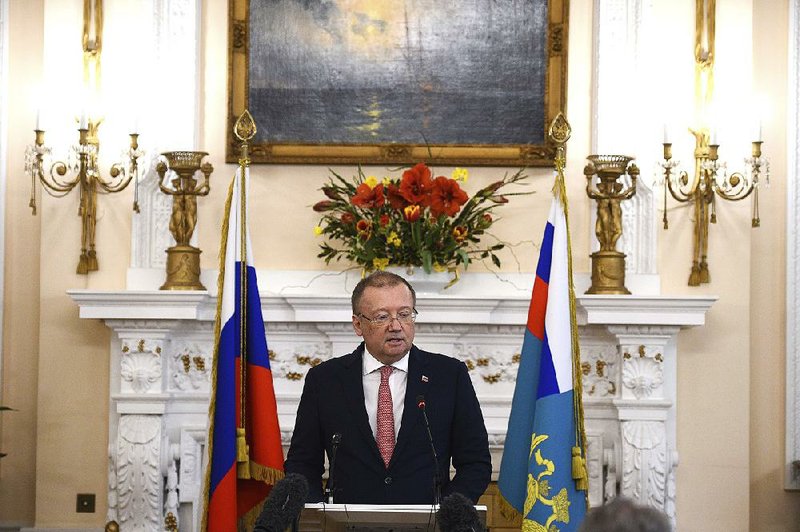BRUSSELS -- The European Union announced early today that it is recalling its ambassador from Moscow for consultations over the nerve-gas attack earlier month against a former spy in Britain, reinforcing a united stand with Prime Minister Theresa May against Russia.
After the EU firmly sided with May in the escalating conflict reminiscent of the Cold War and said it was "highly likely" Russia is behind the attack on Sergei Skripal, Dutch Prime Minister Mark Rutte said the EU envoy "is being recalled for consultations to Brussels."
May won the backing of 27 other EU leaders at a summit Thursday, and the bloc called the attack a "grave challenge to our shared security."
The EU states said they would "coordinate on the consequences to be drawn in the light of the answers provided by the Russian authorities."
May was delighted with the support early today. "This is about us standing together to uphold our values against the Russian threat," she said.
Rutte said no sanctions were actually discussed at the summit even though rumors swirled of more drastic diplomatic measures. President Dalia Grybauskaite of former Soviet state of Lithuania said she was considering expelling Russian diplomats in the wake of the March 4 attack.
Health officials said Thursday that detective Sgt. Nick Bailey, who became seriously ill after responding to the attack, has been released from a Salisbury hospital.
Over the coming days or weeks, Rutte said, "we and our partners must see what the logical next steps are."
He insisted that any measure "must have an added value to this extremely strong political declaration."
The unanimity was a victory for May. She had been striving at a summit in Brussels to persuade her EU colleagues to unite in condemning Moscow over the attack on Skripal, a former Russian military intelligence officer convicted of spying for Britain, and his daughter Yulia.
Russia strongly denies responsibility and has slammed Britain's investigation.
During a summit dinner, May laid out the reasons Britain is convinced Moscow was behind the attack, including the type of poison used -- a Soviet-developed nerve agent known as novichok -- and intelligence that Russia has produced it within the past decade.
Russia has said repeatedly that the nerve agent used against the Skripals could have come from another country or a nonstate group.
But Britain argues the attack is part of a pattern of behavior by an increasingly assertive Russia whose muscle-flexing, cyber-meddling and lawbreaking on foreign soil pose a threat to the international rule of law.
May said Thursday that "it is clear that the Russian threat doesn't respect borders." She said "the incident in Salisbury was part of a pattern of Russian aggression against Europe and its near neighbors, from the western Balkans to the Middle East."
But European politicians and leaders varied in how far they were willing to go in blaming the Kremlin.
French President Emmanuel Macron and German Chancellor Angela Merkel gave May strong backing after meeting her on the sidelines of the EU summit. The British prime minister's office said they agreed "there is no plausible explanation other than that the Russian state was responsible."
German politician Manfred Weber, leader of the biggest group in the European Parliament, said Russian President Vladimir Putin "wants to destabilize the European idea" and Europe must be strong in its response.
But Greek Prime Minister Alexis Tsipras was more cautious. He said "we have to express our solidarity to the U.K., to the British people, but at the same time we need to investigate."
Putin's office said Thursday that Tsipras had called Putin to congratulate him on his re-election and discuss issues, including the Salisbury poisoning.
Luxembourg Prime Minister Xavier Bettel said he wanted to hear what May had to say before making up his mind.
"First I listen, and then I take a decision," he said.
The Salisbury attack has sent relations between London and Moscow to Cold War-style lows. For one, the countries have expelled 23 of each other's diplomats.
Russia's ambassador to the U.K., Alexander Yakovenko, accused the U.K. on Thursday of having a "bad record of violating international law and misleading the international community."
"History shows that British statements must be verified," he told reporters in London, demanding "full transparency of the investigation and full cooperation with Russia" and the Organization for the Prohibition of Chemical Weapons.
Britain says it is complying with the international chemical-weapons watchdog.
On Wednesday, British Foreign Secretary Boris Johnson said Russia's hosting of the the World Cup soccer tournament this summer could be compared to the 1936 Olympics, which was used as a propaganda exercise by Nazi Germany. Putin spokesman Dmitry Peskov called that comparison an "utterly disgusting statement that is unworthy of a foreign minister of any country."
Information for this article was contributed by Lorne Cook, Raf Casert, Nataliya Vasilyeva and Greg Katz of The Associated Press.
A Section on 03/23/2018
